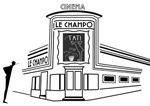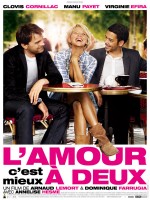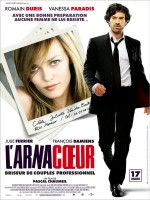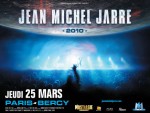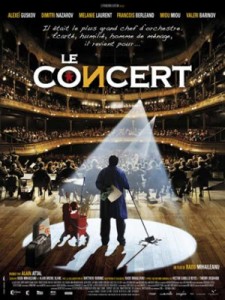 Le Concert, 4ème film de Radu Mihaileanu, avait tout pour réussir en France. Un sujet en or, un scénario levant l’empathie, de bons acteurs, une presse au pâmoison. Et puis, voilà, patatras ! après un début en fanfare, le film s’est trouvé relégué dans les bas fonds du classement des meilleures entrés de l’année. Que s’est-il donc passé pour emberlificoter ainsi la spirale ascendante d’un film où l’on voit Andreï Filipov, homme de ménage au Bolchoï, après en avoir été le chef l’orchestre, tomber sur un fax adressé au directeur du Bolchoï dans lequel le Théâtre du Châtelet convie l’orchestre du Bolchoï à venir jouer à Paris. Andreï FIlippov réunit alors ses anciens amis musiciens en les faisant passer pour le Bolchoï …
Le Concert, 4ème film de Radu Mihaileanu, avait tout pour réussir en France. Un sujet en or, un scénario levant l’empathie, de bons acteurs, une presse au pâmoison. Et puis, voilà, patatras ! après un début en fanfare, le film s’est trouvé relégué dans les bas fonds du classement des meilleures entrés de l’année. Que s’est-il donc passé pour emberlificoter ainsi la spirale ascendante d’un film où l’on voit Andreï Filipov, homme de ménage au Bolchoï, après en avoir été le chef l’orchestre, tomber sur un fax adressé au directeur du Bolchoï dans lequel le Théâtre du Châtelet convie l’orchestre du Bolchoï à venir jouer à Paris. Andreï FIlippov réunit alors ses anciens amis musiciens en les faisant passer pour le Bolchoï …
Si le film reste, il faut l’avouer un peu faible, il est parsemé d’instants de grâce et de bonnes idées et l’histoire est belle … Mais cela suffit-il ? En fait, je me demande si la comédie est le bon terrain d’expression de Radu Mihaileanu. Quant à la musique, sublime, notamment interprétée par Mélanie Laurent, elle a permis au réalisateur de repartir avec deux récompenses lors de la 35e cérémonie des César, samedi dernier, où Le Concert était nominé pour le prix du meilleur film : le César du meilleur Son (remis à Pierre Excoffier, Bruno Tarrière, Sélim Azzazi) et le César de la meilleure musique (remis à Armand Amar). Autant dire que l’Académie des Césars a remis un prix à Tchaïkovski !
Quant au Bolchoï lui-même, je profite de ce billet pour vous rappeler quelques faits marquants du plus grand théâtre de Russie. Le Bolchoï, à l’origine (1776), est le nom d’une troupe de comédiens et de danseurs. Sans théâtre fixe, elle se produit chez les aristocrates et, grâce à une notoriété grandissante, attise l’intérêt du pouvoir. Le tsar Nicolas II veut son théâtre impérial. Il l’aura avec le Bolchoï. Aujourd’hui, l’édifice peut accueillir 2.000 spectateurs et dispose d’une scène monumentale de 22 mètres de profondeur. Sur le plan artistique, le Bolchoï a toujours été voué à la patrie, à la culture russe et… à la politique. Par exemple, les tournées internationales (75 % du Bolchoï), permirent, jusqu’à Gorbatchev, à des agents doubles, d’enrichir les informations du KGB. Les artistes qui se prêtèrent au jeu, se virent octroyer de luxueuses récompenses. Après l’effondrement de l’URSS, Le Bolchoï partit en ruine et sa compagnie ne fut pas renouvelée. En août 2000, Vladimir Poutine enclencha de grands travaux de rénovation. Tout devrait être fini en 2011. En attendant, le site Internet officiel du théâtre est consacré à un appel aux dons. Les PDG de grandes entreprises sont invités à investir dans la rénovation du grand théâtre. Grâce aux capitaux privés, le Bolchoï retrouvera-t-il sa grandeur sachant que« Bolchoï » signifie « Grand » en langue russe? Trop tôt pour le dire.
Disconcerting
’The Concert’, the 4th film by the director Radu Mihaileanu, had all the makings of a box office hit in France… a great subject, a plot that everyone could relate to, good actors, and swooning media coverage. And yet it fell flat on its face! After a clamorous start, the film found itself wallowing at the bottom of the list of the highest-grossing films of the year. So just what caused the downfall of this film which tells the story of Andreï Filipov, a cleaner at the Bolshoi, after having been the orchestra conductor, coming across a fax addressed to the director of the Bolshoi in which the Theatre du Châtelet invites the Bolshoi orchestra to come and play in Paris. So Andreï Filipov reunites his old musician friends and passes them off for the Bolshoi orchestra…
Although the film remains, I have to admit, a bit weak, it is interspersed with brilliant moments and good ideas and the story itself is great… But is that enough? In fact, I can’t help wondering whether comedy is the best means of expression for Radu Mihaileanu. Nevertheless, the music, which is sublime, with a noteworthy performance by the actress Mélanie Laurent, allowed the film to pocket two awards at the 35th Cesar Film Awards Ceremony last Saturday, where it was even nominated for the best film award. So, in the end it won the César Award for Sound (presented to Pierre Excoffier, Bruno Tarrière, and Sélim Azzazi) and the César Award for Best Music (presented to Armand Amar), in other words the Césars Academy awarded a prize to Tchaikovsky!
As for the Bolshoi itself, I would like to take advantage of this post to remind you of some of the key facts about the most famous Russian theatre. Originally (back in 1776) the Bolshoi was the name of a troupe of actors and dancers who, having no set theatre to play in, performed in the homes of Russian aristocrats and, thanks to their growing fame, caught the eye of Tsar Nicolas II himself. He wanted an imperial theatre and would get it with the Bolshoi. Today, the theatre can seat 2000 spectators and has an immense stage extending back for 22 metres. The artistic angle at the Bolshoi has always been focused on the fatherland, Russian culture and… politics. For example, up until Gorbachev’s presidency, the international tours (75% of the Bolshoi agenda) allowed double agents to gather information for the KGB. The artists who played along were generously rewarded. After the collapse of the Soviet Union, the Bolshoi Theatre fell into ruin and its company was not renewed. In August 2000, Vladimir Putin launched huge renovation work, which should be finished in 2011. In the meantime, the official website of the theatre is devoted to appealing for donations. The CEOs of large companies are invited to invest in the renovation of the great theatre. Thanks to private capital, will the Bolshoi regain its grandeur, given that ‘Bolshoi’ means ‘great’ or ‘large’ in Russian? For the moment it is too early to say.
Didier MOINEL DELALANDE


